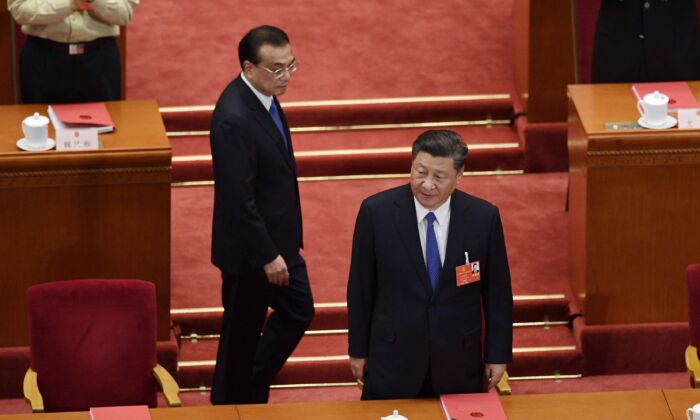Hong Kong Activists Applaud Taiwan’s Historic Recall Election
When Chinese Premier Li Keqiang promoted the idea of setting up a “street vendor economy” to alleviate the country’s unemployment crisis due to the pandemic, it took many by surprise.
For years, clearing away street vendor stands was a priority in big cities. In 2017, authorities established special “urban management” police to enforce regulations forbidding street vendors from selling goods—citing the importance of maintaining a hygienic and civilized image.
After Li made a speech during the May 28 session of China’s rubber-stamp legislature promoting the idea, China’s top e-retailers, including JD.com and Suning.com, and e-commerce platforms like WeChat Pay launched new products and apps to support street vendors interested in selling goods.
In Beijing and Shanghai, many locals started setting up their street vendor stands.
But over the weekend, Chinese state-run media suddenly did an about-face and criticized the idea of a “street vendor economy.”
Some analysts interpreted this reversal as an indication that the Chinese regime wanted to maintain the image of modern metropolises, while also hoping to save retail stores.
Hong Kong newspaper Apple Daily cited insider sources who said the u-turn signaled a difference between how Li and current regime leader Xi Jinping envisioned economic policies, and thus reflected a power struggle between the two.
Meanwhile, U.S.-based China affairs commentator Tang Jingyuan believed that the conflict was not between the two political leaders, “but between a socialism system and people’s livelihood.”
Tang explained that the Chinese economy has suffered from business inactivity during the CCP virus outbreak. Then, when the virus spread to countries around the world and impacted their economies, the demand for China’s exports dropped dramatically.
When the Chinese regime began promoting street vendor businesses, it signaled to the public that China’s socialist economy was unsuccessful in ensuring the country’s prosperity, Tang said.
 A crawfish vendor sits in Jiqing street in Wuhan, China on June 5th, 2020. (Getty Images)
A crawfish vendor sits in Jiqing street in Wuhan, China on June 5th, 2020. (Getty Images)Street Vendor Economy
During a video-based press conference in Beijing on May 28, Chinese premier Li Keqiang explained that the country had a large unemployment and poverty problem that had been exacerbated by the pandemic.
Li suggested that people could become street vendors to make a living.
“About two weeks ago, I read a report which said a western Chinese city set up 36,000 mobile vendor stands. In one night, about 100,000 people had a job [as vendors],” Li said.
On June 1, Li visited an old residential compound in Yantai city of eastern China’s Shandong Province to further promote the idea.
Li said while visiting the vendor stands: “The street stalls and small shops are important sources of jobs. They are the cooking fires of the human world. As with bigger and high-end industries, they are also vital to the country’s economy.”
After Li’s speeches, Chinese cities lifted their bans on street vendors and encouraged people to set up shop.
Beijing-based magazine Caijing, in a June 4 report, quoted Yao Yang, an expert at Peking University, who noted that many major cities around the world allow street vendors to sell their wares, such as in New York, Paris, and London.
 Attendants pour tea for Chinese leader Xi Jinping during the opening session of the rubber-stamp legislative conference at the Great Hall of the People in Beijing, China on May 22, 2020. (LEO RAMIREZ/AFP via Getty Images)
Attendants pour tea for Chinese leader Xi Jinping during the opening session of the rubber-stamp legislative conference at the Great Hall of the People in Beijing, China on May 22, 2020. (LEO RAMIREZ/AFP via Getty Images)U-Turn
However, on June 6 and June 7, a newspaper operated by the Beijing city government, Beijing Daily, published three commentaries to criticize the “street vendor economy.”
The commentaries said that because street stalls are “full of counterfeit and fake products,” “unsanitary and uncivilized,” “very noisy,” and “blocks car traffic…they are bad for the image of our country and our country’s capital.”
Beijing Daily also said that government organs will remove any street stalls that have already been set up.
On June 7, China’s state broadcaster CCTV aired a commentary piece titled, “The street vendor economy cannot be rushed into action.”
The CCTV piece emphasized that “the basic needs for promoting the economy is: resuming production, manufacturing, markets, and businesses.” This was a quote from Xi’s speech made in February to encourage businesses to reopen following the epidemic.
On June 6 evening, the Chinese Communist Party’s mouthpiece newspaper People’s Daily published a commentary titled, “The street vendor economy can be hot, but it shouldn’t become a fever.”
The commentary stated that while street stalls can provide economic benefits, each local government should regulate street vendors, such as by collecting management fees; limiting the amount of space and operating hours for selling; and checking the sanitation condition of food suppliers.
 A vendor is selling fruits on a street in Wuhan, China on April 23, 2020. (Getty Images)
A vendor is selling fruits on a street in Wuhan, China on April 23, 2020. (Getty Images)Radio Free Asia (RFA) quoted an employee from Chinese state-run media Xinhua, who said that on June 4 evening, the Party’s propaganda department instructed all media to stop reporting on the “street vendor economy.”
That same night, the Party’s Central Guidance Commission on Building Spiritual Civilization, another propaganda organ, revoked regulations allowing for street vendor stands in cities, the same insider told RFA.
Focus News: Beijing Reverses Stance on Promoting Street Stalls to Alleviate Unemployment, Indicating Split in Party
Trump Pulls Back National Guard Following Washington Protests
